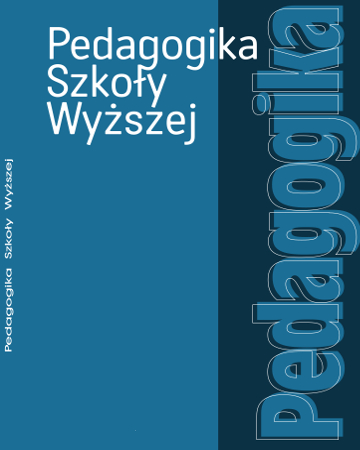
ISSN: 2083-4381
OAI
DOI: 10.18276/psw.2018.2-02


Issue archive /
2/2018 (24)
Autonomia edukacji akademickiej w warunkach centralizmu programowego i dekretowanych efektów kształcenia
(AUTONOMY OF ACADEMIC EDUCATION IN THE CONDITIONS OF PROGRAM CENTRALISM AND DECREEING OF LEARNING OUTCOMES)
| Authors: |
Maria
Czerepaniak-Walczak
Uniwersytet Szczeciński |
| Keywords: | autonomy academic education educational interactions Act 2.0 |
| Data publikacji całości: | 2019 |
| Page range: | 12 (21-32) |
Abstract
In this text attempts to look at the possibilities of experiencing autonomy in everyday educational situations
in a higher school and its consequences for the development of a person and for social change in
the conditions of bureaucratic control of academic education. The specificity of autonomy in relation to
empowerment and emancipation is presented. The consequences of infantilization the participants of
education (both students and teachers) are underlined. The statutory regulations on the functioning of
the educational activities of the university in the content of the Act 2.0 in the context of autonomy are
discussed. In the end, the author shares her experience in attempt of overcoming routine in educational
interactions. Referring to the personal examples of the practice of autonomy in university education, he
indicates its importance for science and research as well for personal and collective life, for everyday “life
outside the academy”.
Download file
Article file
Bibliography
| 1. | Czerepaniak-Walczak, M. (2006). Pedagogika emancypacyjna. Kształtowanie świadomości krytycznej człowieka. |
| 2. | Gdańsk: GWP. |
| 3. | Ferrante, E. (2017). Historia nowego nazwiska. Katowice: Wydawnictwo Sonia Draga. |
| 4. | Freire, P. (1970). Pedagogy of the Oppressed. New York: Continuum. |
| 5. | Freire, P. (1993). Education for critical consciousness. New York: Seabury Press. |
| 6. | Furedi, F. (2017). What’s Happened to the University. A Sociological Exploration of its Infantilisation. New |
| 7. | York: Routledge. |
| 8. | Harari, Y.N. (2018). Homo Deus. Krótka historia jutra. Kraków: Wydawnictwo Literackie. |
| 9. | Shor, I. (1992). Empowering Education. Critical Teaching for Social Change. Chicago–London: The University |
| 10. | of Chicago Press. |
| 11. | Smużewska, M. (2015). Studencki ruch naukowy w polskich uniwersytetach z perspektywy zmian |
| 12. | zachodzących we współczesnym szkolnictwie wyższym. Nauka i Szkolnictwo Wyższe, 1 (45), 215–233. |
| 13. | Stiegler, B. (2017). Wstrząsy. Głupota i wiedza w XXI wieku. Warszawa: Wydawnictwo Naukowe PWN. |
| 14. | Ustawa (2018). Ustawa z 20.07.2018 – Prawo o szkolnictwie wyższym i nauce. Dz.U. 2018, poz. 1668. |
| 15. | Walicki, A. (1983). Zniewolony umysł po latach. Warszawa: Czytelnik. |